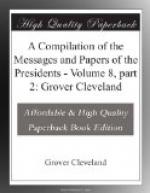deemed not only equal to the indemnification of the
public, but to insure a considerable surplus to the
city to be employed for its improvement, provided
they are offered for sale only in sufficient numbers
to meet the existing demand. But the act of 1796
requires that they shall be positively sold in such
numbers as shall be necessary for the punctual payment
of the loans. Nine thousand dollars of interest
are lately become due, $3,000 quarter yearly will continue
to become due, and $50,000, an additional loan, are
reimbursable on the 1st day of November next.
These sums would require sales so far beyond the actual
demand of the market that it is apprehended that the
whole property may be thereby sacrificed, the public
security destroyed, and the residuary interest of
the city entirely lost. Under these circumstances
I have thought it my duty before I proceed to direct
a rigorous execution of the law to submit the subject
to the consideration of the Legislature. Whether
the public interest will be better secured in the
end and that of the city saved by offering sales commensurate
only to the demand at market, and advancing from the
Treasury in the first instance what these may prove
deficient, to be replaced by subsequent sales, rests
for the determination of the Legislature. If
indulgence for the funds can be admitted, they will
probably form a resource of great and permanent value;
and their embarrassments have been produced only by
overstrained exertions to provide accommodations for
the Government of the Union
Th. Jefferson.
JANUARY 12, 1802.
Gentlemen of the Senate:
I now communicate to you a letter from the Secretary
of State inclosing an estimate of the expenses which
appear at present necessary for carrying into effect
the convention between the United States of America
and the French Republic, which has been prepared at
the request of the House of Representatives.
Th. Jefferson.
JANUARY 27, 1802.
Gentlemen of the Senate and of the House of Representatives:
I lay before you the accounts of our Indian trading
houses, as rendered up to the 1st day of January,
1801, with a report of the Secretary of War thereon,
explaining the effects and the situation of that commerce
and the reasons in favor of its further extension.
But it is believed that the act authorizing this trade
expired so long ago as the 3d of March, 1799.
Its revival, therefore, as well as its extension, is
submitted to the consideration of the Legislature.
The act regulating trade and intercourse with the
Indian tribes will also expire on the 3d day of March
next. While on the subject of its continuance
it will be worthy the consideration of the Legislature
whether the provisions of the law inflicting on Indians,
in certain cases, the punishment of death by hanging
might not permit its commutation into death by military
execution, the form of the punishment in the former
way being peculiarly repugnant to their ideas and
increasing the obstacles to the surrender of the criminal.




